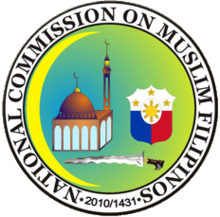National Commission on Muslim Filipinos
| Pambansang Komisyon sa mga Pilipinong Muslim | |
 | |
| Commission overview | |
|---|---|
| Formed | February 8, 2010 |
| Preceding Commission |
|
| Jurisdiction | Government of the Philippines |
| Headquarters | 79 Jocfer Annex Bldg., Commonwealth Avenue, Quezon City, Philippines |
| Commission executives |
|
| Website |
www |
The National Commission on Muslim Filipinos is a government agency whose objective is to promote the rights of Muslim Filipinos and to make them active participants in Philippine nation-building.[1] On August 11, 2008, the Commission, which also serves as a link between the government and the country's Muslim minority, replaced the Office on Muslim Affairs, which had been pursuing the same aim since 1987.[2]
NCMF is one of the 12 agencies, formerly from the Office of the President which now placed under the supervision of the Cabinet Secretary, based on Executive Order #1 issued by President Rodrigo Duterte on July 4, 2016.[3]
Major Development Programs
Pursuant to its mandate, the NCMF is pursuing the following major development programs:
- Promotion and development of Muslim economic affairs;
- Promotion, development and enhancement of Muslim culture and institutions;
- Promotion and development of Muslim settlements;
- Coordination with other Muslim countries;
- Coordination, supervision and administration of pilgrimage;
- Rehabilitation of rebel returnees;
- Institutional support to Qu’ran reading competitions;
- Support to Shari’ah project implementation;
- Support to Madrasa education;
- Implementation of socioeconomic and cultural development programs; and
- Support services program.
Composition
The main difference between the Commission and its predecessor is its composition: the Office on Muslim Affairs was headed by three Directors, who were appointed by the President. The seven members of the new Commission are still appointed by the President. All of them, however, must be Muslim Filipinos; one female, one a religious leader, the other five each from a different tribe.[4] These provisions aim to represent the whole of the Muslim Filipino community equitably in the Commission. The members hold office for six years, the position of chairman changes biannually, so as to prevent any single tribe from gaining a dominant position in the Commission.
Bureaus
The Commission also consists of specialized Bureaus:
- Bureau of External Relations
- Bureau of Muslim Settlements
- Bureau of Muslim Economic Affairs
- Bureau of Muslim Cultural Affairs
- Bureau of Peace & Conflict Resolution
- Bureau of Pilgrimage and Endowment
- Bureau of Legal Affairs
Functions
Pursuant to Republic Act 9997, the Commission fulfills several functions:
- Advising and assisting the President on issues affecting the Muslim Filipino community;
- Providing legal assistance;
- Promoting and organizing the annual Hajj;
- Prescribing rules for the establishment of awqaf;
- Promoting and supervising the Madrasa education system;
- Providing scholarships; and
- Being the primary agency through which Muslims can seek government assistance or redress.
References
- ↑ Section 2 of the Act Creating the National Commission on Muslim Filipinos of 11 August 2008
- ↑ Executive Order No. 122-A Creating the Office on Muslim Affairs of 1987 (repealed)
- ↑ Ranada, Pia (July 4, 2016). "Duterte's 1st EO: Simpler, faster anti-poverty services". Rappler. Retrieved July 4, 2016.
- ↑ Section 5 of the Act Creating the National Commission on Muslim Filipinos of 11 August 2008